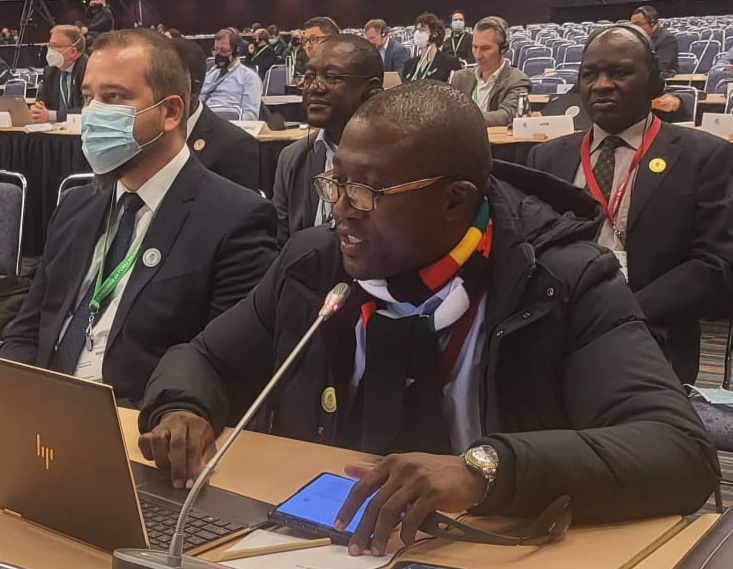|
Getting your Trinity Audio player ready...
|
The 15th Conference of the Parties (COP15) to the United Nations Convention on Biological Diversity (CBD) is currently underway in Montreal Quebec, Canada. This is an international meeting bringing together governments from around the world focusing on protecting nature and halting biodiversity loss around the world.
The Minister of Environment, Climate, Tourism, and Hospitality Industry Hon Nqobizitha Mangaliso Ndhlovu is leading the Zimbabwe delegation at this ongoing COP15.
Speaking at the High-Level Ministerial segment of COP15 Minister Ndhlovu said that the loss of biodiversity is extremely worrying and calls for nations to take practical measures to stem this imminent catastrophe. The rapid decline of biodiversity has serious implications for humanity ranging from the collapse of food production, economic decline, and compromise of health systems among others.
“Excellences, the loss of biodiversity is extremely worrying and calls for nations to take practical measures to stem this imminent catastrophe. This rapid decline of biodiversity has serious implications for humanity ranging from the collapse of food production, economic decline, and compromise of health systems among others. We strongly believe that the Post 2020 GBF will provide parties with the necessary guidance and catalyze support for biodiversity conservation,” Hon Ndhlovu said.
Zimbabwe is endowed with diverse flora and fauna species, soil, and agricultural biodiversity that are of immense conservation value to our national economy. Biodiversity is the cornerstone of Zimbabwe’s economy and the livelihoods of the majority of people. The Protected Area network coverage is a combined total area of about 26% of Zimbabwe’s total land area.
He also articulated that Zimbabwe has recently completed its first-ever Biodiversity Economy Report which is the first step towards the economic valuation of biological assets. The Government of Zimbabwe is committed to continuing mainstreaming biodiversity and ecosystem services within and across all policies and sectors as well as developing a national biodiversity finance plan to ensure a smooth flow of resources to biodiversity conservation projects.
This makes up what Zimbabwe describes as a well-connected network of biodiverse ecosystems including Trans-frontier Conservation Area (TFCA) initiatives. Access to a healthy and clean environment is a constitutional right for all Zimbabweans and to deliver on this mandate, the government continues to strive to combat the triple planetary crisis of biodiversity loss, pollution, and climate change.
Improved financing, continuous engagement of stakeholders including local communities; gender mainstreaming; enhanced law enforcement, and establishment of Transfrontier Conservation Areas (TFCAs) with neighbouring countries have all contributed significantly to biodiversity conservation. Zimbabwe has also embarked on a 5-year nationwide wetland restoration initiative targeting the ecological restoration of 350 000 ha of degraded wetlands in a bid to restore the ecological integrity of the wetland ecosystems and their dependent flora and fauna species.
Furthermore, Zimbabwe recently completed its first-ever Biodiversity Economy Report which is the first step towards the economic valuation of its biological assets. The country is now taking the necessary steps to develop a Natural Capital Accounting framework which will include measuring the flow of ecosystem services. This approach will ensure that the economic, social, and environmental dimensions of biodiversity conservation and sustainable use are coherent and consistent.
“Excellences, whilst Zimbabwe has registered this progress in biodiversity conservation, greater strides will be taken with the Post 2020 GBF coming into effect. As we set new targets and goals, new funding streams and more financial resources; technology transfer; capacity building and knowledge management systems are critical inputs for the achievement of the set targets.
“A robust Resource Mobilization strategy is key as we require sustainable, reliable, and uninterrupted flow of resources to finance restoration and conservation projects in the long term. We are hopeful that the GBF will close the financing gap and ensure that there is fair and equitable access to finances for developing nations such as my country. Zimbabwe fully supports the establishment of a dedicated Global Biodiversity Fund as determined in Articles 20 and 21 of the Convention as it will ensure a steady flow of resources to developing parties as envisaged under Target 19.1 of the GBF.”
Zimbabwe, like the rest of Africa, supports the fair and equitable sharing of benefits from genetic resources in any form including digital sequence information. To this end, it supports the establishment of a global multilateral benefit-sharing mechanism in accordance with article 10 of the Nagoya Protocol to support the conservation and sustainable use of biological diversity.
The Zimbabwe delegation also includes the Deputy Minister of Lands, Agriculture, Fisheries, Water and Rural Resettlement Hon V. Haritatos, Zimbabwe Representative to the United Nations Ambassador A. Chimbindi, Director General ZimParks Dr F.U. Mangwanya, Director of Environmental Management Agency Mr. S. Kangata, representatives from Forestry Commission, Ministry and other key stakeholders.






